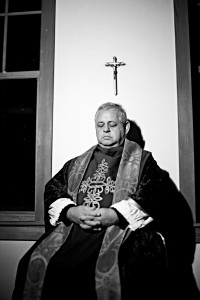Doubt, A Parable
Undoubtedly effective
Strong script, competent performances power Doubt
Garden Theatre, Winter Garden, Florida
From The Orlando Weekly, February 11, 2015
“Doubt can be a bond as powerful and sustaining as certainty,” John Patrick Shanley wrote. He should know, as he not only authored the Tony Award-winning play on the subject but wrote and directed the movie, which garnered Oscar nominations for all four principals.
It’s fair to say, therefore, that the quality of Shanley’s writing is categorically not in doubt. So the only major hurdle that remains for director Beth Marshall and her actors in this Garden Theatre production is to bring to life the paranoia, profundity, ambiguity and even claustrophobia that the play posits. And despite some stilted staging and dramatic flatness in the early-going, that hurdle is ultimately overtopped with dexterity.
Set in St. Nicholas, a Catholic church and school in the Bronx in 1964, Doubt, a Parable is the tale of disciplinarian Sister Aloysius, who is skeptical of the new, progressive priest, Father Flynn. Using spurious evidence reluctantly provided by young, naive Sister James, the elder nun convinces herself that the priest is engaged in an improper relationship with 12-year-old Donald Muller, the school’s only black student.
Yet that is really just the MacGuffin – as Alfred Hitchcock would say – to move the play to greater topics. In this case, it’s a discussion of mental conviction versus facts, doubt against certainty, and the darkness of gossip versus the fair light of justice – all within the context of Christian forgiveness and charity. And the play, perhaps more so than the film, is able to focus intensely on those morally ambiguous questions thanks to its one-act brevity (90 minutes with no intermission) and the power of live theater.
Michael Wanzie – practically an Orlando theatrical institution by himself – never fails to engage us as Father Flynn, in his Garden Theatre debut. It’s unfair to compare his performance to that of Philip Seymour Hoffman in the movie, but, nevertheless, Wanzie doesn’t come close enough to matching the believability and nuance of Hoffman. Like Wanzie, Shonda Thurman (as Donald’s mother) isn’t stellar, but she is still able – in her one scene – to display the intensity and tragedy of her character, giving the production a much-needed energy boost that catapults it to an emotionally fulfilling conclusion.
Though Wanzie and Thurman are competent, this production belongs to Ginger Lee McDermott as Sister Aloysius and Chelsey Panisch as Sister James. McDermott is in complete command of subject and space, while Panisch comes closest to matching her cinematic counterpart (Amy Adams) by capturing not just the requisite sweetness and innocence, but also the understated passion.
The theatre’s space is small, but scenic designer Tom Mangieri nevertheless manages to bring to life three distinct locations. Making the space seem larger and more majestic is lighting designer Amy Hadley, who utilizes visually pleasing rear-backdrop projections. Still, the actors appear able to move naturally only when venturing out of the three-location design or, in the case of Wanzie, roaming around the audience.
Shanley called doubt “infinite, a passionate exercise,” and speculated that audiences might leave his play with uncertainty. But uncertainty is rarely this entertaining.
© 2015 Orlando Weekly / MeierMovies, LLC
